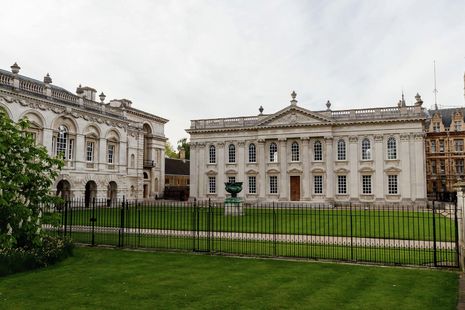Cambridge courses need ‘structural changes’ to tackle excessive workload, report finds
The University has published its review of teaching, commissioned to tackle a ‘culture of overwork’

A review of Cambridge teaching has recommended “structural changes” to tackle a “culture of overwork” within the University.
The University General Board and Colleges’ Committee launched a Review of Teaching in December 2023 to investigate how student workload affects “mental health and wellbeing”.
This came after an SU forum found that 59% of students struggle to cope with the Cambridge workload earlier this year.
The review was penned by a “Task & Finish” group led by Bhaskar Vira, pro-vice-chancellor for education. The task force included representatives from the schools and colleges of the University, as well as two student representatives appointed by the Students’ Union (SU).
The review set out eleven recommendations for reform in order to assist staff and students in achieving a “healthy work/life balance”. These included setting “appropriate boundaries” for academic timetables, following complaints that teaching activities are occasionally scheduled “very late or very early during the day”.
The report recommended exploring “structural changes” to course organisation, to address “significant issues of pace and volume” for student workload.
The report does not explicitly suggest reading weeks as a recommendation to ease student workload. The University Council rejected a proposal for a pilot reading week last year.
Sarah Anderson, the SU Undergraduate President, and Katie Clarke, the SU Undergraduate Access, Education and Participation Officer, told Varsity that “a reading week is not off the table and is precisely one of the potential ‘structural changes’ the review mentions”.
“As part of the review, we shall be encouraging other departments [beyond the History department, which implemented reading weeks for Part I students in 2022] to consider similar measures to best support their students’ success and wellbeing,” Anderson and Clarke stated.
The review also investigated “the sustainability of the supervision system,” finding that there is “great variation” in how supervisors are supported across different courses.
The group suggested providing supervisors with guidance documents to aid them in designing work, a reform recommended for implementation in Michaelmas term.
Following a recent pay rise agreement struck between the University and the supervisors’ union, the review group has recommended that Cambridge “endorse and embed” the amended pay rate methodology. The new pay system, which the review says will be implemented in Michaelmas, sees supervisor wages increase by 15% on average.
The Task & Finish group will continue working through Michaelmas 2024, researching “possible actions” to address the problems raised. Its final recommendations are expected to be published in Lent 2025.
Responding to the initial report’s recommendations, SU officers Anderson and Clarke said they “welcome the findings of this review, which demonstrates the University finally recognising, and committing to tackle, the damaging culture of overwork at Cambridge”.
“It is one of our top priorities this year to continue our predecessors’ work in pushing this Task and Finish group to go further, including recommending and implementing substantive changes to teaching at Cambridge by the next academic year,” they added.
A spokesperson for the University of Cambridge told Varsity: “The Task & Finish Group, comprising representatives from all six Schools, Colleges and the student body, have made their initial recommendations following their Review of Teaching. These initial suggestions seek to take the first steps towards addressing student concerns around their workload, its impact on mental health and wellbeing, and the supervision system.”
“Work will continue towards more concrete and final recommendations in the Lent Term 2025. The Group has not formally considered a reading week at this time. It is exploring a wide range of structural and programme-specific changes to aid student wellbeing and does not assume that a reading week is the best or only option available,” they said.
 News / Hundreds of Cambridge academics demand vote on fate of vet course20 February 2026
News / Hundreds of Cambridge academics demand vote on fate of vet course20 February 2026 News / Judge Business School advisor resigns over Epstein and Andrew links18 February 2026
News / Judge Business School advisor resigns over Epstein and Andrew links18 February 2026 News / Petition demands University reverse decision on vegan menu20 February 2026
News / Petition demands University reverse decision on vegan menu20 February 2026 News / CUCA members attend Reform rally in London20 February 2026
News / CUCA members attend Reform rally in London20 February 2026 News / Caius students fail to pass Pride flag proposal20 February 2026
News / Caius students fail to pass Pride flag proposal20 February 2026










